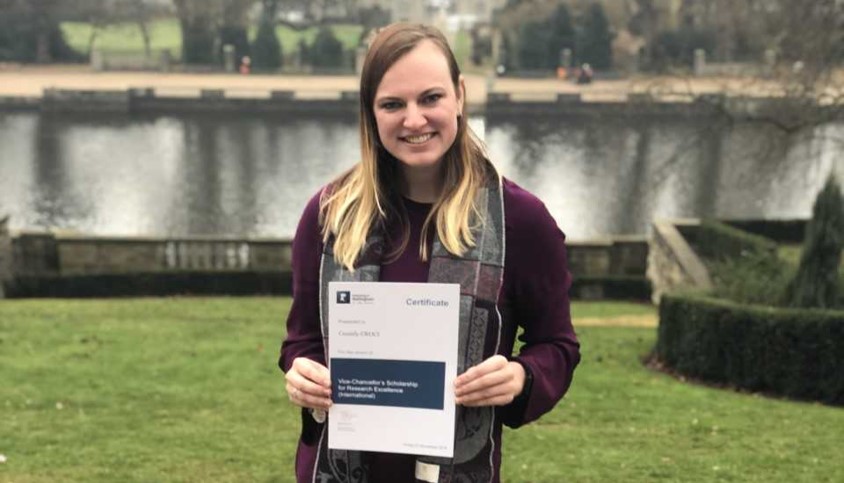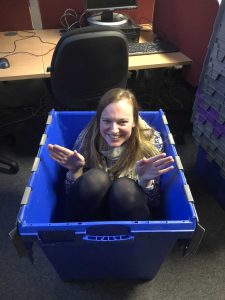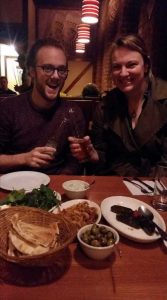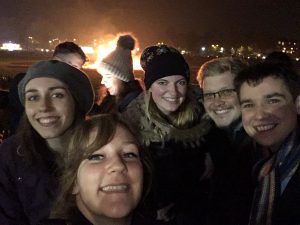
February 6, 2019, by International students
International Student Ambassadors: Cassidy from the United States
Why did you choose to study your specific course and what are your favourite aspects of the course so far?
 I chose to return to Nottingham for my PhD because of their commitment to interdisciplinary research and the academic community. My PhD project combines Social Network Analysis, medieval Icelandic texts, and literary and historical methods. To support this research, I have an interdisciplinary supervision team comprised of scholars from the School of English and the Department of History. Very few universities could have provided me with the proper guidance for this ambitious research project. Furthermore, the entire academic community wants me to succeed and it is great to feel valued not only as a researcher, but as a person. Also, not many universities can claim to have a Centre for the Study of the Viking Age and it is wonderful to have so many people passionate about Vikings.
I chose to return to Nottingham for my PhD because of their commitment to interdisciplinary research and the academic community. My PhD project combines Social Network Analysis, medieval Icelandic texts, and literary and historical methods. To support this research, I have an interdisciplinary supervision team comprised of scholars from the School of English and the Department of History. Very few universities could have provided me with the proper guidance for this ambitious research project. Furthermore, the entire academic community wants me to succeed and it is great to feel valued not only as a researcher, but as a person. Also, not many universities can claim to have a Centre for the Study of the Viking Age and it is wonderful to have so many people passionate about Vikings.
If you were awarded a scholarship, please give details of the scholarship and the impact it has had on your studies
I was awarded two scholarships: the Vice-Chancellor’s Scholarship for Research Excellence (International) and the Christine Fell Award. The Vice-Chancellor’s Scholarship covers my tuition during the duration of my PhD. This scholarship has made it financially possible to attend Nottingham and was a major factor whilst determining PhD programmes. Additionally, networking events with other international students have made this scholarship valuable not only financially, but personally. The Christine Fell Award was awarded by the School of English for my research in Old Norse and Viking Studies. This scholarship demonstrates the commitment of the School of English to specialised medieval programmes as well as honouring their past faculty members. Professor Christine Fell OBE established Viking Studies at Nottingham and without her work my studies would not be possible.
Tell us about your experiences of food in Nottingham. Have you been able to find food from your home country/region?
 Coming from the Midwestern United States, it is easy to find familiar food chains like McDonald’s, Taco Bell, Five Guys, etc. In England, however, I was more excited to be exposed to cuisines I never had the opportunity to try. In Nottingham you can find the world on your plate! From Spanish tapas at Bar Iberco, Indian curries at Mowgli, and even New England style burgers at Annie’s, it is easy to find something that you will like or reminds you of home. Additionally, most places are student-friendly and give discounts if you show your student card or a Unidays code.
Coming from the Midwestern United States, it is easy to find familiar food chains like McDonald’s, Taco Bell, Five Guys, etc. In England, however, I was more excited to be exposed to cuisines I never had the opportunity to try. In Nottingham you can find the world on your plate! From Spanish tapas at Bar Iberco, Indian curries at Mowgli, and even New England style burgers at Annie’s, it is easy to find something that you will like or reminds you of home. Additionally, most places are student-friendly and give discounts if you show your student card or a Unidays code.
Also, there are smaller markets as well as supermarkets like Sainsbury’s and Tesco if you want to keep it cheap and make your own meals.
Do you have any tips for adapting to the academic environment in the UK?
In the United States, it is easy to be held accountable because you likely have class at least once a day and homework due at least once a week. In the UK you might have two or three classes total in a week and only one term paper that comprises your grade. My advice would be do not think of days with no class as free days, but rather do something small related to your course once a day so that you are not cramming everything at the end. It could be as simple as reading an article or writing 50 words, but all the little things add up. Also, plan your final papers well in advance so that you have plenty of time to edit. Do not be afraid to talk to your lecturers in office hours if you are struggling to adjust to the UK academic system. They will more likely than not help you with your issues related to the course and help you stay focused.
What attracted you to the UK?
As a scholar studying the Viking Age, I felt that it was important to research in an area where the Vikings settled. It is surreal as an American to be able to hold a Viking object found in Lincolnshire that is older than your country in your hand. Indeed, the layers of history are present in all parts of England. From rural villages with Anglo-Saxon churches to Norman castles in Colchester there is something for everyone to admire.
What has been your experience of making friends with people from other countries?
If you are involved with a group or close with your cohort it is relatively easy to make friends with people from other countries. I was previously on the University of Nottingham volleyball performance team and had teammates from Hong Kong, Greece, Luxembourg, England, and the Netherlands. I was able to learn interesting things about these cultures all because of sport. I even learnt about sports like netball and cricket that are not prominent in the United States because the wide-ranging amount of sporting options offered by the University.
How have you adapted to the climate?
 Coming from the Midwest, I had to adapt to having the holidays without snow. Additionally, I found that I do not have to wear my rain boots or raincoat in Nottingham as much as expected. Everyone in the United States told me it was going to rain every day in England when, there might be a quick shower every few days.
Coming from the Midwest, I had to adapt to having the holidays without snow. Additionally, I found that I do not have to wear my rain boots or raincoat in Nottingham as much as expected. Everyone in the United States told me it was going to rain every day in England when, there might be a quick shower every few days.
Travelling to campus
Once you have chosen were to live start thinking about how to get to your campus to save costs on the front end. Since I now live in city centre, I take the tram into campus and use a Robin Hood student card so I do not have to worry about constantly topping up my card. Some of my friends use the Mango card to top up if they do not come into campus as frequently. When I lived in Beeston, I could easily walk to University Park campus in under thirty minutes. During my master’s I lived at Raleigh Park so I would walk to Jubilee campus and would take the free hopper bus to University Park.
If you have any questions about studying at the University of Nottingham as an international student, you can get in touch with our International Ambassadors via email.
No comments yet, fill out a comment to be the first

 English
English
Leave a Reply